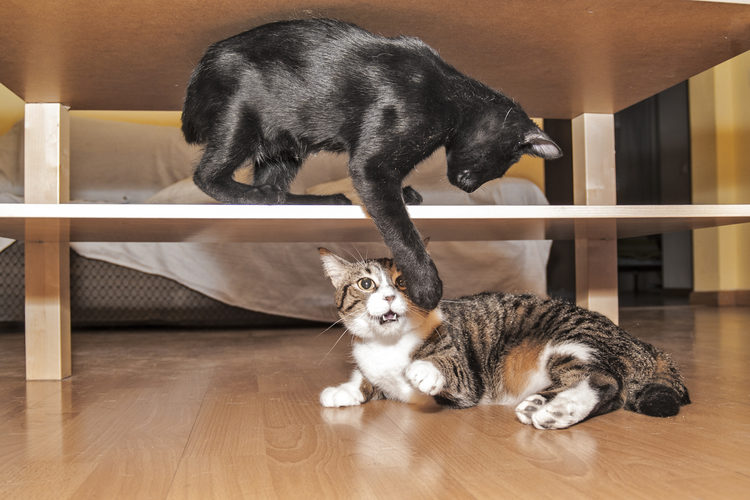Does your multi-cat household constantly resemble a violent UFC match? Do you find yourself continually pleading with your cats: “why, oh why, can’t we all just get along?”
Cats are creatures of mystery, but there are several known reasons why your felines may be butting heads. And, thankfully, there are plenty of solutions to make even the biggest of cat “bullies” get along.
Possible Reasons Your Cats May Not Be Getting Along
The first thing you need to do is pinpoint the probable cause of your cats’ distress so you can address it appropriately.
There are the obvious fur-flying, banshee-screaming cat fights, which you’ll have zero trouble detecting. Some signs of conflict, however, are more subtle — such as one cat blocking the pathway to the litter box or claiming your bed at night.
If you notice any signs of tension between your cats, examine their environment to see if any of the following reasons could be causing their kitty angst.
1. Not Enough Resources
Are your cats sharing a food and water bowl? Do they only have one shared litter box among them? What about toys: just a couple or plenty to go around?
When cats think that resources are limited, competition can strike.
You know there’s enough food to go around. But your kitties, not so much. And they will battle to claim ownership of whatever resources are available.
 2. Under-Socialization
2. Under-Socialization
Your “bully” cats may be acting out because they’ve had zero contact with other felines, leaving them with inferior social skills. If they’ve never made a cat-friend, they might react strongly when you bring cat # 2 home.
Cats also prefer routine and consistency. Introducing a second cat into their already-established environment can ruffle feathers – erm, fur.
3. Personality clash
You know that coworker who steals your tuna sandwiches out of the office fridge and has really bad breath and overall just gets under your skin in a major way? Just like humans, cats have distinct personalities. And, also just like humans, certain cats will simply rub each other the wrong way.
This clash can be magnified as your cats age since differences with maturity levels contribute to aggravation and stress.
4. Mixed Up Post-Vet Scent Signals
When cats live together, they share a common scent. A vet visit can be all it takes to throw that familiar, shared scent off kilter.
When your cat returns home, he’ll be covered in a foreign scent that makes his feline roommates react to him as an unwelcome stranger. Luckily, this should resolve itself quickly once the smell dissipates.
5. Underlying Medical Problems
Extreme aggression could be the by-product of an underlying medical problem. Cats will express pain or discomfort by lashing out at an innocent bystander. Get your cat checked out by their vet to rule out illness as the cause of their hostility.
5 Ways to Deal with Cat Fights
To curb aggressive feline bullying and restore peace to your multi-cat household try one of the following approaches:
1. Increase Resources.
Set up multiple feeding stations in separate areas. Same goes for litter boxes. And toys. And affection, even. Your cats will be much more at ease if they don’t think they need to guard their turf.
2. Add Vertical Space.
This is a big one. And something that’s easy to overlook, since us humans typically prefer to keep our feet planted firmly on the ground.
Being high up is hardwired into a cat’s DNA. Insufficient vertical space will spark feuds among your kitties as they duke it out for prime elevated real estate.
Think: cat trees, window perches, cat shelves. They’ll give your cats a place to retreat or sleep while preventing murderous tendencies from bubbling to the surface.
3. Interactive Playtime.
Help your kitties associate their roomies with positive vibes by engaging in interactive play with both of them present. Try holding a fishing toy in each hand and be sure to divide attention equally among your cats.
Don’t show favorites. Even if you’re ticked at one cat for bad behavior. Remember, your love and affection is considered a resource. One that cats will compete over.
4. Try Pheromones.
Feliway has developed a line of products that mimic the natural pheromones your cat produces when he’s happy. Keep your kitty calm and less reactive with one of their diffusers or sprays.
5. Start From Scratch.
If all else fails, reintroduce your kitties as if they’ve never met before.
Separate your cats into their own individual “sanctuaries,” and make the introduction gradual.
Some cats, sadly, will never get along. If this occurs, the best thing may be to rehome one cat rather than forcing them to live a life of stress and fear.
Have you ever experienced cat fights in your multi-cat household? Which solution worked for you? Let us know in the comments below!







